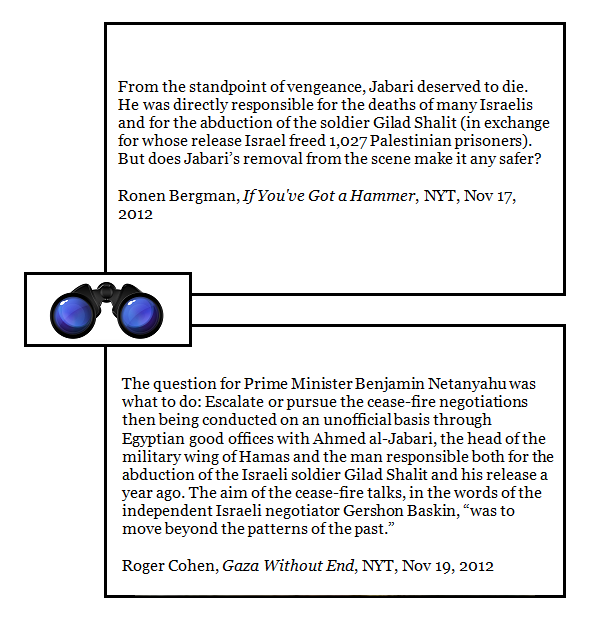[ by Charles Cameron — this began with two quotes about the killing of Ahmed al-Jabari and ended up reminding me of traffic flows ]
.
So very much depends on nuance, doesn’t it? There are, after all, one-way streets and two-way streets:
Surely there’s more nuance in describing al-Jabari as “the man responsible both for the abduction of the Israeli soldier Gilad Shalit and his release a year ago” than as “directly responsible for the deaths of many Israelis and for the abduction of the soldier Gilad Shalit”.
**
Does that mean that abducting Gilad Shalit and releasing Gilad Shalit cancel each other out?
In my opinion, not.
But if in this case, (x) plus (-x) does not equal 0, it’s because that “plus” doesn’t represent an addition, it represents an incarceration — one in which Shalit himself was “cared for” under Jabari’s instructions, according to Gershon Baskin in his own NYT piece, Israel’s Shortsighted Assassination –
No, Mr. Jabari was not a man of peace; he didn’t believe in peace with Israel and refused to have any direct contact with Israeli leaders and even nonofficials like me. My indirect dealings with Mr. Jabari were handled through my Hamas counterpart, Ghazi Hamad, the deputy foreign minister of Hamas, who had received Mr. Jabari’s authorization to deal directly with me. Since Mr. Jabari took over the military wing of Hamas, the only Israeli who spoke with him directly was Mr. Shalit, who was escorted out of Gaza by Mr. Jabari himself. (It is important to recall that Mr. Jabari not only abducted Mr. Shalit, but he also kept him alive and ensured that he was cared for during his captivity.)
Cared for, maybe — but still incarcerated.
In street terms, there are times when a multi-lane two-way street gets divided so that perhaps three lanes go one way and only one the other — when, in moral terms, there’s no moral equivalency, but still some truth, some justice on both sides. That’s the sort of situation that calls for even more nuance… some of which, to my mind, Baskin provides with what is essentially a “no, but” formulation — no, Jabari was not a man of peace, but, it is important to recall…
**
Look, I think the ability to envision flow patterns is one of the keys to understanding complicated and complex situations — and graphics does a better job of it than linear thinking. Contraflow lane reversal is an interesting example:
Neither General Gordon nor the Mahdi lived to see this one:
The White Nile Bridge connecting Khartoum, Sudan and Omdurman, with 4 lanes total. Traffic is generally directed equally, 2 lanes to Khartoum and to lanes from except in the morning, where it’s 3 lanes towards Khartoum, and in the evening, 3 lanes towards Omdurman.
**
Of course, you don’t want your efforts to make an unexpected Dynamic Lane Reversal and blow back on you.
But that at least seemed to be James Zogby‘s concern, when he wrote:
One can only wonder whether when the Israelis made the decision to assassinate Ahmed al Jabari they were foolish enough to assume that their attack would be the end of it. Having been down this same road before, where assassinations only led to escalation and then full-scale hostilities, one might have hoped that someone in the Israeli high command would have recalled 2008 or 2006 (and so many other tragic, bloody episodes in the past) and cautioned that “no good will come of this.” When I heard an Israeli Ambassador tonight saying that “we must finish them off, so we can sit with moderates and talk peace,” it became all too clear that no lesson had been learned.
**
I sometimes wonder whether maybe outcomes are above the human pay grade.





